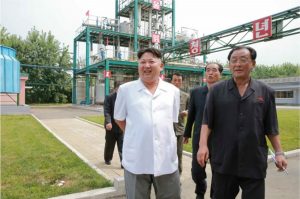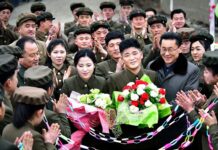The Sunchon Phosphatic Fertilizer Factory — promoted by North Korean authorities as “a creation of self-reliant strength and prosperity” — has been unable to properly produce phosphatic fertilizer since the plant’s completion over a year ago.
To escape criticism over the plant’s non-existent production, however, the authorities are reportedly employing the “crude strategem” of shipping fertilizer produced at other plants from the Sunchon factory.
In a phone conversation with Daily NK on Wednesday, a source in North Korea said the Sunchon Phosphatic Fertilizer Factory has been unable to produce a finished product, even though the plant was completed over a year and two months ago. “It’s completely unable to produce ammonium phosphate,” he said, speaking on condition of anonymity. “And as for superphosphate of lime, it’s simply being packaged with fertilizer produced in other factories.”
The Sunchon Phosphatic Fertilizer Factory is supposed to produce a dry fertilizer synthesized from ammonium phosphate and superphosphate of lime. Unable to produce ammonium phosphate, however, the plant has been unable to ship phosphatic fertilizer.
The plant has reportedly experienced supply problems with sodium sulfate, which is needed during the calcination process for white phosphorus, silica, and sodium sulfate.
Sodium sulfate — called yusan in North Korea — is generally produced in Hamhung, South Hamgyong Province. However, with production limited, the Sunchon Phosphatic Fertilizer Factory has not been receiving sufficient supplies of the chemical.
Moreover, the plant is reportedly unable to import the equipment needed to remove fluorine from apatite, rendering it unable to manufacture ammonium phosphate.

Additionally, although the factory was designed to be fully automated, only manual production is currently possible because the country has been unable to import semiconductor equipment.
Pak Pong Ju, then vice president of the State Affairs Commission, attended the completion ceremony for the plant in May of last year. He said the plant, designed to “produce large amounts of concentrated phosphatic fertilizer from low-grade ore suitable to North Korean conditions,” was equipped to reduce labor requirements by “realizing automation and systemization from the injection of raw materials to the packaging of products.”
At the time, however, it seems there were only plans to automate the plant. The automation system had yet to be completed.
North Korean authorities have reportedly dispatched scientists to Sunchon Phosphatic Fertilizer Factory to develop what the plant needs “through self-reliance.”
The source said a brigade of scientists and technicians composed largely of researchers from the Academy of Sciences and Kim Chaek University of Technology was organized and sent to the factory to “produce [and acquire] the imported resources and equipment in as self-sufficent a way as possible.”
Reporting on the factory’s tape-cutting ceremony last year, the North Korean media said North Korean leader Kim Jong Un “expressed satisfaction about the wonderful creation of the integrated production system of the Sunchon Phosphatic Fertilizer Factory by the teachers and researches [sic] of Kim Chaek University of Technology in cooperation with relevant units.” But according to the source, scientists are still trying to develop solutions for imported equipment and resources.
Meanwhile, North Korean authorities have constructed farms and ranches near the factory to independently provide food to the plant’s workers.
The source said the state aims to normalize production and produce 50,000 tons of phosphatic fertilizer within the year, “but whether they’ll actually be able to do this also remains unclear.”


















